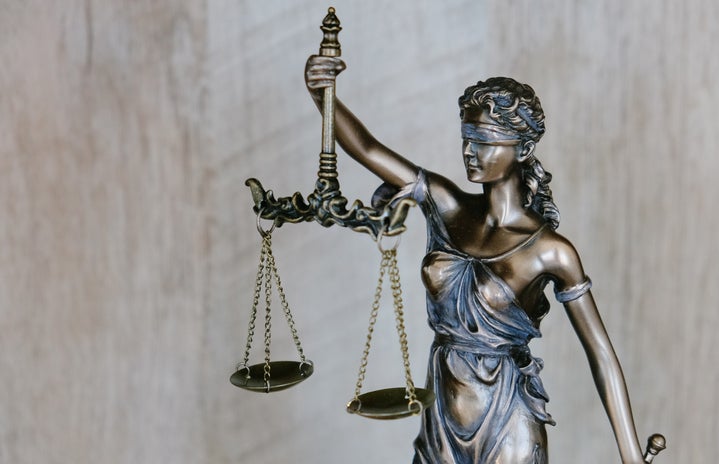Dreams don’t work unless you do, neither does the government. Young scholars, activists, and progressives know this and have been working tirelessly to reveal a peaceful, inclusive future for us all. One of them, Bridgette Gerber-Winschel, 19, of Erie, Pennsylvania, has been such an inspiration to me in her pursuit of justice, equality, and quality of life for all people, not just a few. With Mid-Western roots and passion in her heart, Bridgette has a lot to say when it comes to following your dreams, and never forgetting about both her goals and where she began. From Ohio to New York City, if she can make it there, she’ll make it anywhere, and so can we.
- Her Campus CU Boulder: “Where Are You From?”
-
Bridgette Gerber-Winschel: “I never would normally include this, but I was born in Cincinnati, Ohio, which is basically Kentucky, and I never really lived there long but it’s always very strange in comparison because it’s a very strange place to start. Then I went to the very opposite, I lived in Sandusky, Ohio up until I graduated high school. Sandusky, Ohio is… I don’t even know how to describe it, in a scholarship essay I described it as a dumpster fire and I feel as if that’s probably pretty accurate. It is the human trafficking capital of the country. In Sandusky, we are one of the epicenters of Ohio in the opioid crisis. In Lake Erie there’s a cyanobacterium annual bloom; basically, it’s just algae blooming in the lake every year. All of our water filtration systems are so old, they were built in the public works projects of the 40s with FDR, so they’re bad systems because they’re archaic and the algae will get in, and it’s toxic it can kill you, and it gets into our drinking water supply. We also only have public schools where I’m from, and we have levees which is when they ask the community if taxes may be raised so we can pay for educational supplies for high school. Our rival high school had this system called “Pay to Play,” where you had to pay a fee to play a sport, because that was the only way to generate enough money to buy textbooks, buy laptops, etc. We had to have resource officers, who performed regular drug sweeps.”
“But there’s a lot of good things to growing up like that, but really, that’s why I got into politics because I thought, ‘I feel as if there’s a lot of rules that are being broken, or at least there should be, and nobody’s doing the job, because it’s just that’s the way the Rust Belt is…’ Rashida Talib, I think, is the most ideal Rust Belt woman I’ve ever seen in a public figure. She is very much so a stereotypical, hard shell, do what’s right no matter how much it personally hurts you, if it’s for the greater good then it’s worth it.”
- HCCU: “Why Did You Choose to Get Involved Politically?”
-
BGW: “I knew pretty young, around 11-12, when Obama got into office and I started seeing more female representatives. The third oldest Congressperson Marcy Kaptur was kind of my mortal enemy. She is representative of my gerrymandered district in Ohio, and it is one of the worst gerrymandered districts. It is called, “a mistake on the lake,” it is in a lot of history textbooks I’ve been told by my friends that don’t live in Ohio and knew what I was talking about when I brought that up, but I was like, “Pineapple Sweet Pineapple.”
“I had a bad ex-boyfriend and my dad left when I was 15, so I figured I should probably start somewhere new; there’s a lot of bad juju over here, clearly some stuff that needs to be worked out. I think you do have to go to the bigger cities, you have to go where money, quality institutions, and progress are, and that’s on the east or the west coast. So, I applied to a bunch of different schools and got a bunch of different scholarships always in the realm of law and politics. I was also, at that time, considering running varsity track in college because I was good at track and I was promised money, and I would do anything for money. Eventually, I got to St. John’s University, which offered me enough academic scholarships because of the number of college credits I took in high school. Going back to Sandusky being poor, my high school had exactly 3 AP (Advanced Placement) classes; we had macroeconomics, literature, and calculus, that was it. If you want to take classes that are advanced beyond just regular high school level or honors, which is basically the same as regular high school level, there is a community college in the town. This is a very long explanation but it’s important politically because it shows Ohio’s an insane political state, because it’s a battleground state, and if you’re not from the state it’s probably really confusing, but if you’re from the state, you know that legally, everything is insane. So in 1964, because Ohio had the same illiteracy rate as Alabama, they made a law where there had to be a college campus within 30 minutes of any standing point in Ohio, and this did increase our literacy rate; it was effective, but now there’s a million tiny college campuses. But basically, I was set to graduate two years early at St. John’s so they gave me a huge scholarship because they said ‘you’re only to be here for a bit and maybe you’ll go to law school,’ and I was like ‘yeah, maybe.’ Eventually, I graduated high school somehow, got through, got involved in sticky situations in between, but you know it makes for good stories. In August, I moved from my hometown of 7,566 people to New York City, which is somewhere in the multiple millions, and I didn’t know a single person in New York.”
- HCCU: “You’ve Made It to the Big City, describe the feeling.”
-
BGW: “Somebody died, one of my friends, he was a drug dealer in Sandusky and he died in a drive-by and they still haven’t solved his case. As I was getting ready for the Christmas party for my office job, one of our clients was hosting, and it was this high-end, Russian restaurant in Brooklyn, and that was when my friend from back home called me to tell me that he died, and I was like, ‘and I am here…’ It was so crazy, that was the probably the most confused I ever was in my whole life, it was crazy.”
“There were times in my life that for months I would only sleep about three hours a night, every night. One day I was at Umi Sushi, of all places, and he brought me my food and the way he sat it down was exactly the way I used to sit down waiting tables, and I just came from work, and that was a white-collar job that I had gotten right out of high school, I was getting 15 dollars an hour, when before I was getting 6.45 dollars an hour for waiting tables in Ohio. I literally was eating dinner and I just started crying. I was just crying because it was so crazy to see how different life is. I started thinking of how I’m not the only person that deserves this – there are a million other people that do, but that’s why I stay in politics, as much as it drives me crazy, as I know what it’s like, but there’s truly that niceness to life, there’s a good quality of life that people can have, it’s not impossible and we just deny ourselves it in the Rust Belt because we’ve never had it because nobody’s giving it to us… it’s never been an option, but we sure as shit deserve it just as much, if not more than anybody else. It’s the coal miners, factory workers, teachers, and night shift truck drivers, who beat their body to shit that need healthcare and quality resources. I knew I had to leave to do the greater things, to come back and fix everything. I knew that was the only way to do it, I had to leave and come back, but it definitely was at that moment, where you just feel so separated. When I was a little kid, I lived out in the country and I would run around barefoot in fields and I would just literally feel like the stereotypical Ohio tomboy kid and from there, I went to being in designer high heels in New York City as a paralegal, it was insane.”
- HCCU: “To the rest of us fighting day in and day out for progress, what would you say?”
-
BGW: “In this election, we learned more than anything else, that an election includes everybody, and in order to win a campaign honestly and truly. What I believe is the actual American way of politics is getting up off your ass and speaking your mind and representing your home and yourself, even if you shouldn’t have to, but because you need to. I think that’s what true American representative democracy is, I think that this election above any other election has shown us that you have to address the entire nation when you address elections, meaning what are demographics, there are 1.2 million Cajuns in the United States and do you see any of the candidates going into Cajun territory asking if they’re registered to vote? These are extremely poor white and black people, that have been stuck in their homes for the last 50 some years and nobody’s talking to them, that’s 1.2 million people, that is so many people that are just going unaccounted for. I think this election showed more than any other ones, that you even have to have the Cajuns. You have to have every person from every single nook and cranny, regardless of who they are, participating in order for it to be a true American, democracy.”
Bridgette is now studying at the University of Pittsburgh as a Legal Studies major and Political Science minor. Along with being a full time student, she is also working on her public and professional writing certification. Graduating in the spring of 2022, she will without a doubt find herself at a prestigious law school and plans to specialize in criminal and family law. Bridgette, a sister of mine in Phi Alpha Delta, also guest lectures for different places on her clean water insecurity research, and attends clinics pretty regularly; such as the “Global Institute for Human Rights” in the summer, through the Carey Law School of the University of Pennsylvania. She’s made it to New York, now she’s making her way everywhere else. To the young dreamers, who run barefoot in the grass, you too can make it.



